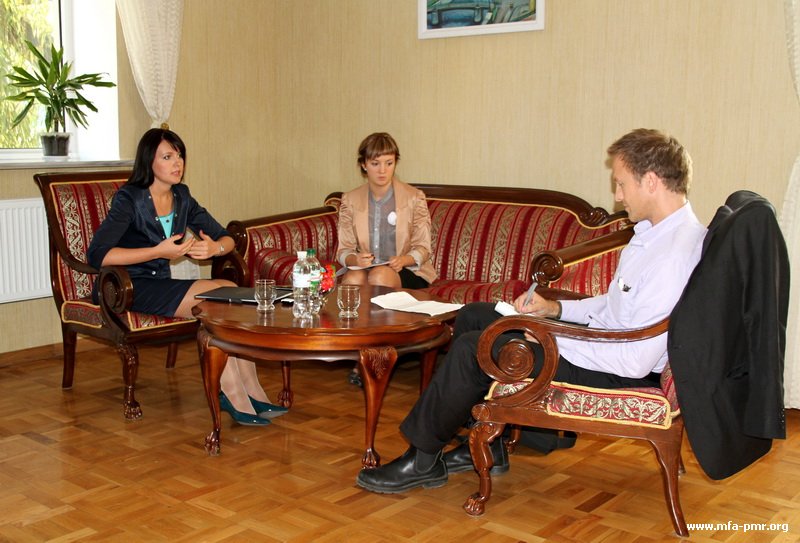Last week Nina Shtanski gave interview to Dublin edition The Irish Times.
On September 25, 2012, an article “Thaw in relations gives sense of hope in Moldovan conflict” was published. The edition notices that despite the doubts among some experts and politicians about the fact that nothing has changed in Pridnestrovie, however, “a closer look at this 400,000-strong sliver of land, separated by the Dniestr river from the rest of Moldova, reveals a tentative thaw in its relations with Chisinau, and a new openness to the world that has stirred hopes that a peaceful and permanent settlement may eventually be found”.
In view of the Irish observer, “change began late last year, with the unexpected election of Yevgeny Shevchuk as president of Pridnestrovie, ousting the incumbent of 20 years, Igor Smirnov”. According to the journalist, diplomats “pin considerable hope on a “new generation” of leaders on either side of the Dniestr”, and some analysts note enthusiasm of Yevgeny Shevchuk for Moscow's plans on creation of Eurasian Union of ex-Soviet states.
In her intercourse with the Irish journalist, Minister of Foreign Affairs of the PMR Nina Shtanski marked that, indeed, over nine months Pridnestrovie and Moldova have been working within resumed 5+2 format which received impetus during January meeting in Odessa between Head of the Pridnestrovie and Moldova's Prime-Minister. “Shevchuk and Filat agreed to start solution of socio-economic problems, thus allowing Pridnestrovian and Moldavian people to communicate freely, to move freely from one bank to another, to develop production, carry out joint business, to achieve other positive results.” According to Nina Shtanski, it was precisely that period of time when tactic of small steps began to be implemented within negotiation process.
In the conversation with the correspondent of The Irish Times,the Minister stressed that new stage in negotiations had already given first young crops: railway link was resumed which brings income both to Pridnestrovie and Moldova; part of dangerous radioactive elements was removed from Pridnestrovie. And quite recently Moldovan side backed Pridnestrovian initiative to observe the three-year moratorium on industrial fishing from the Dniester which should have a favorable impact on ecologic situation.
“On the one hand, we are pleased with what we have managed to achieve in the framework of the small steps tactics,” the Pridnestrovian diplomat tells. “But on the other hand, we express regret over the fact that today there is a number of problems which we cannot resolve”. “Such situation develops when Pridnestrovie takes unilateral steps to meet Moldova. This doesn't correspond to the public demand and thus to the building of atmosphere of trust – the goal which we were aiming at from the very beginning,” the Minister told.
Nina Shtanski is certain that quantity of contacts for Pridnestrovie is not a progress, since they will not substitute results people are waiting for. “We are a young generation and we must move forward quickly demonstrating practical results of our work,” she underlined.
In her conversation, Head of the Pridnestrovian foreign political office addressed the issue of Pridnestrovie's status. “We are already independent. We built our independence on our own. Our status is defined by results of 2006 Referendum.” Nina Shtanski considers that issues relating to status shouldn't be the aim of negotiations. Its aim should be settlement of the conflict, which although is a frozen one, but nevertheless remains a conflict.
Answering the question on the attitude of the Pridnestrovian people to Russia, the Minister marked that the role of the Russian Federation in the fate of the region is strongly positive. “The fact that thanks to Russia we have been able to maintain peace is truly valued by people,” she said. Nina Shtanski again stressed that during 20 years none of the participants of the negotiation process except for the Russian Federation has proposed other guaranties of settlement. “Russia protects the rights of Russian compatriots, Russian citizens living in Pridnestrovie, as well as of those who have no Russian passport – children and retired men,” she told. According to the Minister, negotiations between Pridnestrovie and Moldova were resumed also largely thanks to Russia's assistance. “Russia is a guarantor country not on paper but with real actions,” Nina Shtanski stressed concluding the conversation.








